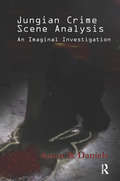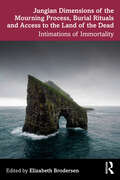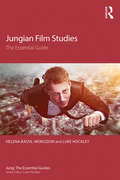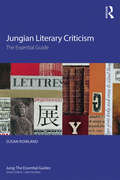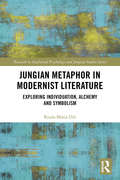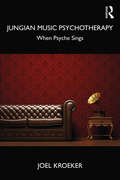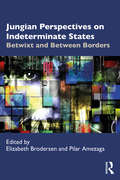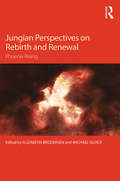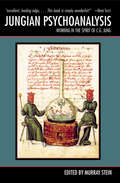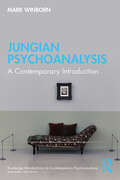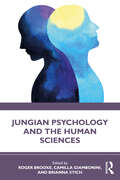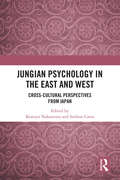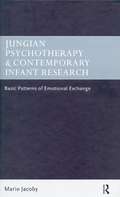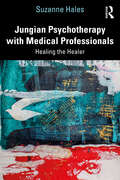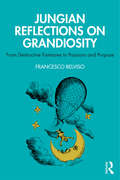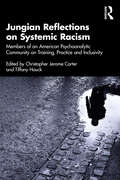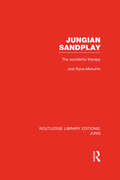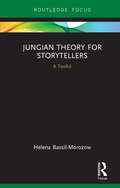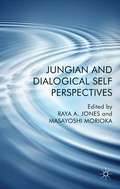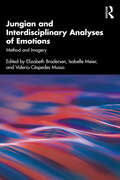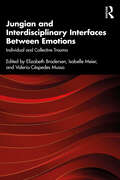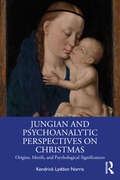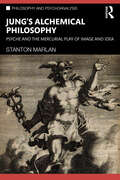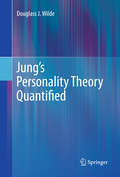- Table View
- List View
Jungian Crime Scene Analysis: An Imaginal Investigation
by Aaron B. DanielsThis book presents the serial killer as having 'imagopathy' - that is, a disorder of the imagination - manifested through such deficiencies as failure of empathy, rigid fantasies, and unresolved projections. The author argues that this disorder is a form of failed alchemy. His study challenges long-held assumptions that the Jungian concept of individuation is a purely healthful drive. Serial killers are unable to form insight after projecting untenable material onto their victims. Criminal profilers must therefore effect that insight informed by their own reactions to violent crime scene imagery, using what the author asserts is a form of Jung's 'active imagination'. This book posits sexual homicides as irrational shadow images in our rationalistic modern culture. Consequently, profilers bridge conscious and unconscious for the inexorably splintered killer as well as the culture at large.
Jungian Dimensions of the Mourning Process, Burial Rituals and Access to the Land of the Dead: Intimations of Immortality
by Elizabeth BrodersenThis innovative volume on the mourning process, burial rites and intimations of immortality offers diverse Jungian, cross-cultural, interdisciplinary, depth-psychological perspectives, written predominantly by graduates and candidates of the CG Jung Institute Zürich. The themes of this book are particularly relevant as they relate to the COVID-19 pandemic and other environmental disasters, when so many people die without a proper burial and are, thus, not properly commemorated with their status value. The contributors cover a wide range of subjects from their clinical observations attached to grief and loss in the prolonged mourning process, the meaning behind burial rites in cyclical and linear temporalities and an analysis of why certain dead are excluded from becoming ancestors. Unconscious processes such as dreams, archetypes and cultural complexes from the personal and collective unconscious are also presented and explored. This collection will be of great interest to interdisciplinary academic researchers, Jungian analysts and students, psychoanalysts, psychotherapists, anthropologists, cultural theorists and students interested in the mourning process, rites of passage, past and present burial practices and the imaginative, symbolic significance of the land of the dead.
Jungian Film Studies: The essential guide (Jung: The Essential Guides)
by Helena Bassil-Morozow Luke HockleyJungian film studies is a fast-growing academic field, but Jungian and post-Jungian concepts are still new to many academics and film critics. Helena Bassil-Morozow and Luke Hockley present Jungian Film Studies: The Essential Guide, the first book to bring together all the different strands, issues and arguments in the discipline, and guide the reader through the various ways in which Jungian psychology can be applied to moving images. Bassil-Morozow and Hockley cover a range of Jungian concepts including the collective unconscious, archetypes, the individuation process, alchemy, and signs and symbols, showing how they can be used to discuss the core cinematic issues such as narrative structure, gender, identity, genre, authorship, and phenomenology. The authors argue that, as a place where the unconscious and conscious meet, cinema offers the potential for imagery that is psychologically potent, meaningful, and that plays a role in our personal psychological development. This much-needed book, which bridges the space between Jungian concepts and traditional film theory, will be essential reading for scholars and students of Analytical Psychology, psychoanalysis, Jungian film studies, media, film and cultural studies, psychosocial psychology and clinical psychology. It will also appeal to analytical psychologists, psychotherapists and readers with an interest in film analysis.
Jungian Literary Criticism: The Essential Guide (Jung: The Essential Guides)
by Susan RowlandIn Jungian Literary Criticism: the essential guide, Susan Rowland demonstrates how ideas such as archetypes, the anima and animus, the unconscious and synchronicity can be applied to the analysis of literature. Jung’s emphasis on creativity was central to his own work, and here Rowland illustrates how his concepts can be applied to novels, poetry, myth and epic, allowing a reader to see their personal, psychological and historical contribution. This multidisciplinary and transdisciplinary approach challenges the notion that Jungian ideas cannot be applied to literary studies, exploring Jungian themes in canonical texts by authors including Shakespeare, Jane Austen and W. B. Yeats as well as works by twenty-first century writers, such as in digital literary art. Rowland argues that Jung’s works encapsulate realities beyond narrow definitions of what a single academic discipline ought to do, and through using case studies alongside Jung’s work she demonstrates how both disciplines find a home in one another. Interweaving Jungian analysis with literature, Jungian Literary Criticism explores concepts from the shadow to contemporary issues of ecocriticism and climate change in relation to literary works, and emphasises the importance of a reciprocal relationship. Each chapter concludes with key definitions, themes and further reading, and the book encourages the reader to examine how worldviews change when disciplines combine. The accessible approach of Jungian Literary Criticism: the essential guide will appeal to academics and students of literary studies, Jungian and post-Jungian studies, literary theory, environmental humanities and ecocentrism. It will also be of interest to Jungian analysts and therapists in training and in practice.
Jungian Metaphor in Modernist Literature: Exploring Individuation, Alchemy and Symbolism (Research in Analytical Psychology and Jungian Studies)
by Roula-Maria DibJungian Metaphor in Modernist Literature argues for the centrality of Carl Jung’s theory of individuation and alchemy in modernist poetics. Through analysis of the uses of a mythic method in modernist literary works, the book develops a related alchemical model which serves to expand understanding of modernist uses of language. The book is an innovative exploration of modernist literary creativity under a Jungian lens, spanning both the literary and scholarly Jungian field. The literary works of Hilda Doolittle, James Joyce and W.B Yeats are read in the light of Jung’s central theme of an ‘alchemical marriage’ with attempts at developing a related alchemical model, a Jungian poetics, which serves to expand a reader’s understanding of modernist uses of language. This provides a fresh new lens through which modernist literature is viewed and seeks to revaluate the role of Jung in the humanities, namely in the field of modernist literature, an area from which Jung has long been shunned. This book will be of great interest for academics, researchers and post-graduate students in the fields of literature, modernism, psychoanalysis, gender studies, Jungian psychology, depth psychology, literary theory, and cultural studies. .
Jungian Music Psychotherapy: When Psyche Sings
by Joel KroekerMusic is everywhere in our lives and all analysts are witness to musical symbols arising from their patient's psyche. However, there is a common resistance to working directly with musical content. Combining a wide range of clinical vignettes with analytic theory, Kroeker takes an in-depth look at the psychoanalytic process through the lens of musical expression and puts forward an approach to working with musical symbols within analysis, which he calls Archetypal Music Psychotherapy (AMP). Kroeker argues that we have lost our connection to the simple, vital immediacy that musical expression offers. By distilling music into its basic archetypal elements, he illustrates how to rediscover our place in this confrontation with deep psyche and highlights the role of the enigmatic, musical psyche for guiding us through our life. Innovative and interdisciplinary, Kroeker’s model for working analytically with musical symbols enables readers to harness the impact of meaningful sound, allowing them to view these experiences through the clarifying lens of depth psychology and the wider work of contemporary psychoanalytic theory. Jungian Music Psychotherapy is a groundbreaking introduction to the ideas of Archetypal Music Psychotherapy that interweaves theory with clinical examples. It is essential reading for Jungian analysts, psychotherapists, psychoanalysts, music therapists, academics and students of Jungian and post-Jungian studies, music studies, consciousness studies, and those interested in the creative arts.
Jungian Perspectives on Indeterminate States: Betwixt and Between Borders
by Elizabeth Brodersen and Pilar AmezagaIn Jungian Perspectives on Indeterminate States: Betwixt and Between Borders, Elizabeth Brodersen and Pilar Amezaga bring together leading international contributors to analyse and interpret the psychological impact of contemporary border crossing - both literally and figuratively. Each chapter assesses key themes such as migration, culture, gender and identity formation, through a Jungian lens. All the contributors sensitively explore how creative forms can help mitigate the trauma experienced when one is forced to leave safety and enter unknown territory, and examines the specific role of indeterminacy, liminality and symbols as transformers at the border between culture, race and gender. The book asks whether we are able to hold these indeterminate states as creative liminal manifestations pointing to new forms, integrate the shadow ‘other’ as potential, and allow sufficient cross-border migration and fertilization as permissible. It makes clear that societal conflict represents a struggle for recognition and identity and elucidates the negative experiences of authoritarian structures attached to disrespect and misrecognitions. This interdisciplinary collection will offer key insight for Jungian analysts in practice and in training, psychotherapists, anthropologists, political and cultural theorists, and postgraduate researchers in psychosocial studies. It will also be of great interest to readers interested in migration, sexuality, gender, race and ethnicity studies.
Jungian Perspectives on Rebirth and Renewal: Phoenix rising
by Elizabeth Brodersen Michael GlockJungian Perspectives on Rebirth and Renewal brings together an international selection of contributors on the themes of rebirth and renewal. With their emphasis on evolutionary ancestral memories, creation myths and dreams, the chapters in this collection explore the indigenous and primordial bases of these concepts. Presented in eight parts, the book elucidates the importance of indirect, associative, mythological thinking within Jungian psychology and the efficacy of working with images as symbols to access unconscious creative processes. Part I begins with a comparative study of the significance of the phoenix as symbol, including its image as Jung’s family crest. Part II focuses on Native American indigenous beliefs about the transformative power of nature. Part III examines synchronistic symbols as liminal place/space, where the relationship between the psyche and place enables a co-evolution of the psyche of the land. Part IV presents Jung’s travels in India and the spiritual influence of Indian indigenous beliefs had on his work. Part V expands on the rebirth of the feminine as a dynamic, independent force. Part VI analyses ancestral memories evoked by the phoenix image, exploring archetypal narratives of infancy. Part VII focuses on eco-psychological, synchronistic carriers of death, rebirth and renewal through mythic characterisations. Finally, part VIII explores the mythopoetic, visionary dimensions of rebirth and renewal that give literary expression to indigenous people/primordial psyche re-navigated through popular literature. The chapters both mirror and synchronise a rebirth of Jungian and non-Jungian academic interest in indigenous peoples, creation myths, oral traditions and narrative dialogue as the ‘primordial psyche’ worldwide, and the book includes one chapter supplemented by an online video. This collection will be inspiring reading for academics and students of analytical psychology, Jungian and post-Jungian studies and mythology, as well as analytical psychologists, Jungian analysts and Jungian psychotherapists. To access the online video which accompanies Evangeline Rand's chapter, please request a password at http://www.evangelinerand.com/life_threads_orissa_awakenings.html
Jungian Psychoanalysis
by Murray SteinWritten by 40 of the most notable Jungian psychoanalysts - spanning 11 countries, and boasting decades of study and expertise - Jungian Psychoanalysis represents the pinnacle of Jungian thought. This handbook brings up to date the perspectives in the field of clinically applied analytical psychology, centering on five areas of interest: the fundamental goals of Jungian psychoanalysis, the methods of treatment used in pursuit of these goals, reflections on the analytic process, the training of future analysts, and special issues, such as working with trauma victims, handicapped patients, or children and adolescents, and emergent religious and spiritual issues. Discussing not only the history of Jungian analysis but its present and future applications, this book marks a major contribution to the worldwide study of psychoanalysis.
Jungian Psychoanalysis: A Contemporary Introduction (Routledge Introductions to Contemporary Psychoanalysis)
by Mark WinbornJungian Psychoanalysis: A Contemporary Introduction provides a concise overview of analytical psychology as developed by Carl Jung. Mark Winborn offers a succinct introduction to the key elements of Jung’s conceptual model and method, as well as an outline of the major transitions, critiques, and debates that have emerged in the evolution of analytical psychology. Similarities and differences between analytical psychology and other psychoanalytic orientations are also identified. This approach allows those who already have familiarity with the Jungian model to expand their understanding, while also providing an accessible map of the field to those with limited exposure to these concepts. Psychoanalysts, therapists, students, and instructors of all levels of experience will benefit from this unique introduction to the Jungian model of psychoanalysis.
Jungian Psychology and the Human Sciences
by Roger Brooke Camilla Giambonini Brianna StichThis volume brings together selected papers from the 2021 IAJS conference focusing on Jungian psychology’s place within the broader human science field, with contributions providing an interdisciplinary examination of fields such as psychoanalysis, feminism, critical thought, and eco-psychology.The historical foundations of Jungian thought in phenomenology, hermeneutics, the significance of imagination, and the body’s genetics open the book with outstanding essays from both renowned and aspiring new scholars. Chapters highlighting matters of current social, political, and ecological considerations shed light on the intersections between Jungian psychology and much contemporary thought in these fields. The healing process takes center stage in the last part of the book, which will interest readers involved with the broader psychotherapy field.With rigorous and scholarly contributions from a variety of international figures in analytical psychology, this book will be of great interest to all Jungian and depth psychology scholars, students, and analysts in training, as well as readers in the broader human science psychology field interested in current Jungian psychology and phenomenology.
Jungian Psychology in the East and West: Cross-Cultural Perspectives from Japan
by Konoyu Nakamura; Stefano CartaIt is well known that Jung’s investigation of Eastern religions and cultures supplied him with an abundance of cross-cultural comparative material, useful to support his hypotheses of the existence of archetypes, the collective unconscious and other manifestations of psychic reality. However, the specific literature dealing with this aspect has previously been quite scarce. This unique edited collection brings together contributors writing on a range of topics that represent an introduction to the differences between Eastern and Western approaches to Jungian psychology. Readers will discover that one interesting feature of this book is the realization of how much Western Jungians are implicitly or explicitly inspired by Eastern traditions – including Japanese – and, at the same time, how Jungian psychology – the product of a Western author – has been widely accepted and developed by Japanese scholars and clinicians. Scholars and students of Jungian studies will find many new ideas, theories and practices gravitating around Jungian psychology, generated by the encounter between East and West. Another feature that will be appealing to many readers is that this book may represent an introduction to Japanese philosophy and clinical techniques related to Jungian psychology.
Jungian Psychotherapy and Contemporary Infant Research: Basic Patterns of Emotional Exchange
by Mario JacobyInfant research observations and hypotheses have raised serious questions about previous mainstream psychoanalytic theories of earliest childhood development. In Jungian Psychotherapy and Contemporary Infant Research, Mario Jacoby looks at how these observations are relevant to psychotherapeutic and Jungian analytical practice. Using recent findings in infant research, along with practical examples from therapeutic practice, he shows how early emotional exchange processes, though becoming superimposed in adult life by rational control and various defenses, remain operative and become reactivated in situations of intimacy. Jungian Psychotherapy and Contemporary Infant Research will be of interest to both professionals and students involved in analytical psychology and psychotherapy.
Jungian Psychotherapy with Medical Professionals: Healing the Healer
by Suzanne HalesJungian Psychotherapy with Medical Professionals guides therapists, clinicians, and healthcare workers through the transformative healing process of Jungian psychology, demonstrating how the new spirit of medicine will originate from the relationship between the healer and the healed. Through extensive experience and scientific research gathered over the past four decades working closely with physicians, Suzanne Hales presents the telling of their stories that have been historically hushed or hidden away. Hales offers a lifeline for healthcare workers as she weaves together the stories of physicians and their patients with gripping honesty, presenting an intimate glimpse of what happens in the lives of healers and the healed. The book offers support to the healer in need of healing, provides hope for wholeness and restoration, and advocates for those who spend their lifetime advocating for others. The book is of great interest to Jungian analysts, therapists, and trainees, and it is essential reading for anyone working in healthcare, including physicians and healers of all kinds in the landscape of modern medicine.
Jungian Psychotherapy: A Study in Analytical Psychology
by Michael Fordham'This book contains an exposition of therapeutic methods used by analytical psychologists. It is based on Jung's own investigations and includes developments in his ideas and practices that others have initiated. 'Jung held that his work was scientific in that he had discovered an objective field of enquiry. When applying this assertion to analytical psychotherapy one must make it quite clear that, unlike what happens in other sciences, the personality of the therapist enters into the procedures adopted in a way uncharacteristic of experimental method. In the natural sciences study is different in kind and the investigator's personality is significant only in his capacity to be a scientist. By contrast, in analytical therapy the personal influence of the analyst pervades his work and furthermore extends to generations of psychotherapists; the way the author conducts psychotherapy is inevitably influenced having known Jung, having developed a personal loyalty to him and by being treated by three therapists who came under his influence.
Jungian Reflections On Grandiosity: From Destructive Fantasies to Passions and Purpose
by Francesco BelvisoIn Jungian Reflections on Grandiosity: From Destructive Fantasies to Passions and Purpose, Francesco Belviso presents a dual view of grandiosity as a destructive obsession that, when approached with curiosity and awareness, has the potential of fueling our lives with a sense of purpose, while being a positive force in the world. Explaining Jungian psychological concepts in an engaging style, the book begins by examining the origins of grandiose fantasies in children, and how grandiosity persists well into adulthood, in our dreams, fantasies, and strivings. Exploring its relation to narcissism and delusions, the book describes how grandiosity can hijack many areas of our lives—as we chase fame, beauty, knowledge, youth, and even morality—often with disastrous consequences. The book’s second half explores how grandiosity can help us identify our passions and callings, ending with a discussion on how to pursue them with integrity and courage. Weaving stories from Greek mythology to Dante’s poetry, from the heroic lives of Rosa Parks to Captain Sully, from fairy tales to our everyday decisions about careers, finances, selfies, and dating, and from the lives and nighttime dreams of his patients and his own, Belviso invites us to explore the larger-than-life aspirations that stir us all. This book offers ideas and tools to better understand our ambitions, challenging us to come to terms with our limitations and find personally meaningful paths forward. Jungian Reflections on Grandiosity will be essential reading for academics and students of Jungian studies, as well as analytical psychologists and analysts in practice and in training. It will also be of interest to those wishing to explore Jungian ideas and the role of grandiosity in public and private life.
Jungian Reflections on Systemic Racism: Members of an American Psychoanalytic Community on Training, Practice and Inclusivity
by Christopher Jerome Carter Tiffany HouckThis important collection explores the attitude of white supremacy in analytic psychology starting with its founder, Carl Gustav Jung, utilizing Jungian analytic theory to explore ways in which the erroneous promotion of race ideology in psychoanalysis may be unmasked and corrected to further psychoanalytic theory and practice. The book examines pejorative othering through intrapsychic and inter-relational lenses, identifying under-addressed attitudes and behaviors in which analytic training programs and learning communities may promote an attitude of white supremacy that lurks within Jungian theory. Through personal experiences and clinical vignettes, the authors exemplify a psychoanalytic method of deconstructing systematized and systemic racism within Jungian theory and within the practices of Jungians. In doing so, they utilize the specificity and ingenuity of Jung’s analytic paradigm to offer insight into the work of anti-racism from a depth psychological perspective. The result of a unique collaboration of analysts and analysts-in-training who participate within the same Jungian learning community in New York City, this collection challenges Jungian analysts and organizations to reckon with ethnic and colour biases and to engage the hero’s journey toward forgiveness, reconciling to diversity in promotion of greater individuation and increased organizational/communal inclusivity. Jungian Reflections on Systemic Racism is a must-read for psychoanalytic students, trainees, supervisors, and practitioners, as well as for clinicians, medical professionals, social workers, mental health professionals, sociologists, and anyone interested in the wide impact of the unscientific construct of a 'race'.
Jungian Sandplay: The Wonderful Therapy (Routledge Library Editions: Jung)
by Joel Ryce-MenuhinWhat is sandplay? Can it help adults as well as children? Originally published in 1992, the late Joel Ryce-Menuhin, leading exponent of sandplay, gives an engaging account of this increasingly popular Jungian therapy, drawing on his own wide experience of using sandplay with patients of all ages and backgrounds. He shows how it can help patients to express ‘beyond words and before words’ the deepest archetypal images from the unconscious, and how effective sandplay can be in the healing of pathology, neurosis and grief. A former concert pianist, who became a Jungian analyst, he was the first to introduce Jungian sandplay therapy to Britain.
Jungian Theory for Storytellers: A Toolkit (Routledge Focus on Analytical Psychology)
by Helena Bassil-MorozowJungian Theory for Storytellers is a toolkit for anyone using Jungian archetypes to create stories in fiction, TV, film, video games, documentaries, poetry, and many other media. It contains a detailed classification of the archetypes, with relevant examples, and explains how they work in different types of narratives. Importantly, Bassil-Morozow explores archetypes and their significance in characterization, individuation, plot and story-building. Bassil-Morozow also presents an overview of Jung’s thoughts on creativity and other Jungian concepts, including the unconscious, ego, persona and self and the individuation process, and shows how they are linked to conflict. The book provides an explanation of relevant Jungian terms for a non-Jungian audience and introduces the idea of the hero’s journey, with examples included throughout. Accessibly written yet academic, both practical and engaging, and written with a non-Jungian audience in mind, Jungian Theory for Storytellers is an ideal source for writers and screenwriters of all backgrounds, including academics and teachers, who want to use Jungian theory in their work or are seeking to understand relevant Jungian ideas.
Jungian and Dialogical Self Perspectives
by Raya A. Jones Masayoshi MoriokaThis collection of cutting-edge chapters contributes to the psychology of personhood especially (but not only) as applied in psychotherapy. The chapters are written from Jungian, dialogical-self, or both perspectives and give insights into the history of ideas, clinical and research applications of these perspectives in the East and West.
Jungian and Interdisciplinary Analyses of Emotions: Method and Imagery
by Valeria Céspedes Musso Elizabeth Brodersen Isabelle MeierThis comprehensive collection of chapters concentrates on the multifaceted theme of emotions, and deepens our understanding of the role emotions play within the psyche.Leading international psychoanalysts and academics offer broad interdisciplinary dimensions using their own unique perspectives on the topic of emotions. Delineating into five parts, this volume focuses on key themes such as emotions, imagination, and method; the emotional basis of archetypes and complexes; relational trauma; mapping contagion across cultures; the contribution from neuroscience; and, finally, dreams and the transcendent. Clinical cases presented underline the important role unconscious, disassociated emotions play in the formation of symptomatology and how wholeness is facilitated through their acceptance.This collection offers a timely contribution to the interdisciplinary study of emotions placing Jungian psychology firmly within that framework. It will be of great interest to Jungian analysts, trainees, and psychotherapists, as well as interdisciplinary academic researchers interested in methodology, unconscious processes, transference, and dreams.
Jungian and Interdisciplinary Interfaces Between Emotions: Individual and Collective Trauma
by Valeria Céspedes Musso Elizabeth Brodersen Isabelle MeierC.G. Jung stressed that emotions are the driving forces behind social and psychological lives, enabling individuals to connect with themselves and their environment. Divided into five parts, this innovative volume explores the enmeshments between emotions.The material locates emotions within the context of nonverbal, developmental somatic embodiment, eco-political and psychosocial engagement, gender and LGBTQ+. Shadow phenomenology, history, myth and the effects of war are likewise explored in depth. Each theme expertly stimulates a resurgence of Jungian and non-Jungian clinical and academic interest in the role that emotions play in contemporary thought and in the impetus for eco-socioeconomic change.This volume will be of great interest to Jungian analysts and trainees, psychotherapists, and interdisciplinary cultural theorists. It will aid scholars in Jungian academic studies and related fields interested in metaphor, symbols, gender, and LGBTQ+ perspectives.
Jungian and Psychoanalytic Perspectives on Christmas: Origins, Motifs, and Psychological Significances
by Kendrick Lyddon NorrisBy examining its history, traditions, symbols, and representation in the arts through the lens of three major schools of depth psychology, Kendrick L. Norris, a Jungian Analyst and minister, shows how better understanding of the promise of Christmas can allow us to discover what it is that we long for the most.Why does the winter celebration of Christmas have such a deep-rooted resonance, individually and collectively? This extensively researched book clearly and engagingly articulates the soul reasons why this holiday has such a significant impact on the human psyche. The work begins with an explanation about how depth psychology can be used to understand the Christmas phenomenon, followed by an investigation into the origins and symbols of Christmas. The book closes by delving into the soul meaning of Christmas through the perspectives of Freud, Kohut, and Jung.This thought-provoking volume will appeal to Jungian Analysts, psychoanalysts, and psychotherapists, as well as those interested in religion and its relation to depth psychology.
Jung’s Alchemical Philosophy: Psyche and the Mercurial Play of Image and Idea (Philosophy and Psychoanalysis)
by Stanton MarlanTraditionally, alchemy has been understood as a precursor to the science of chemistry but from the vantage point of the human spirit, it is also a discipline that illuminates the human soul. This book explores the goal of alchemy from Jungian, psychological, and philosophical perspectives. Jung’s Alchemical Philosophy: Psyche and the Mercurial Play of Image and Idea is a reflection on Jung’s alchemical work and the importance of philosophy as a way of understanding alchemy and its contributions to Jung’s psychology. By engaging these disciplines, Marlan opens new vistas on alchemy and the circular and ouroboric play of images and ideas, shedding light on the alchemical opus and the transformative processes of Jungian psychology. Divides in the history of alchemy and in the alchemical imagination are addressed as Marlan deepens the process by turning to a number of interpretations that illuminate both the enigma of the Philosophers’ Stone and the ferment in the Jungian tradition. This book will be of interest to Jungian analysts and those who wish to explore the intersection of philosophy and psychology as it relates to alchemy.
Jung’s Personality Theory Quantified
by Douglass J. WildeJung's Personality Theory Quantified fills an urgent need for professionals using the Myers-Briggs Type Indicator® (MBTI) to map it on to the cognitive modes of Jung's personality theory, avoiding potential logical errors in the traditional "type dynamics" method. It furthers Jung's original concepts while placing them on a solid axiomatic basis not possessed by other personality theories. Bringing these quantitative findings to the millions of MBTI users - managers, consultants, counsellors, teachers, psychoanalysts and human resource professionals - will require further education of those already certified to administer the instrument according to type dynamics. For this reason numerical exercises follow most chapters to make the book a source reference for briefer workbooks usable in enhanced certification programs. Backed by quantitative theory and new graphical methods, the pioneering qualitative typology work of Myers and Briggs is thus extended to yield deeper understanding of the vital topics of human personality, creativity and human relations. Jungian psychoanalysts may find Jung's Personality Theory Quantified helpful in organizing complicated clinical information and it can also enhance the work of MBTI practitioners worldwide.
